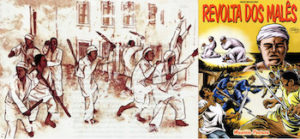
*On this date in 1835, The Malê Revolt occurred. Also known as The Great Revolt) it was a Black Muslim slave rebellion in Salvador da Bahia, Brazil.
During the last days of Ramadan that year, in the city of Salvador da Bahia, a group of Black Muslim slaves and freedmen, inspired by Muslim teachers, rose against the government. Muslims were called malê in Bahia at this time, from Yoruba imale that designated a Yoruba Muslim. The uprising happened on the feast day of Our Lady of Guidance, a celebration in Brazil’s Bonfim church’s cycle of religious holidays. As a result, many worshipers traveled to Bonfim for the weekend to pray or celebrate. Authorities were in Bonfim to keep the celebrations in line. Consequently, there would be fewer people and authorities in Salvador, making it easier for the rebels to occupy the city.
The Brazilian slaves knew about the Haitian Revolution and wore necklaces bearing the image of President Dessalines, who had declared Haitian independence. While the revolt was scheduled for January 25, it was forced to start before the planned time due to various incidents. On January 24, slaves began to hear rumors of an upcoming rebellion. While multiple accounts of freed slaves telling their previous masters about the revolts, only one was reported to the proper authorities. Sabina da Cruz, an ex-slave, fought with her husband, Vitório Sule, the day before and went looking for him. She found him in a house with many of the other revolt organizers, and after they told her tomorrow, they would be masters of the land, she reportedly said, “On the following day, they’d be masters of the whiplash, but not of the land.”
After leaving this house, she went to her friend Guilhermina, a freedwoman, who Sabina knew had access to whites. Guilhermina then proceeded to tell her white neighbor, André Pinto da Silveira. Several of Pinto de Silveira’s friends were present, including Antônio de Souza Guimarães and Francisco Antônio Malheiros, who took it upon themselves to relay the information to the local authorities. All of this occurred between 9:30 and 10:30 pm on January 24. President Francisco de Souza Martins informed the Chief of Police, who reinforced the palace guard, alerted the barracks, doubled the night patrol, and ordered boats to watch the bay by 11:00 pm. At around 1:00 am on Sunday, justices of the peace searched the home of Domingos Marinho de Sá. Domingos reported to the patrol that his tenants were the only Africans in his house. However, sensing Domingos’ fear, the justices asked to see for themselves. They went down into his basement and found the ringleaders planning.
The Africans then started the revolt. Out on the streets, the fighting saw several people injured, and two Africans were killed, including Sabina da Cruz's husband. After securing the area, the rebels split up in different directions throughout the city. Most groups did little fighting; the largest group traveled up the hill toward Palace Square and continued to fight. The rebels decided first to attack the jail, attempting to free a Muslim leader, Pacífico Licutan. Unfortunately for the rebels, the reinforced palace guard began firing on them from across the square, and they were caught between lines of fire in front of the jail. Under heavy fire, the slaves withdrew from the prison and retreated to the Largo de Teatro. Reinforcements arrived for the slaves, and together, they attacked a nearby post of soldiers and took their weapons.
They marched toward the officer's barracks; however, the soldiers could pull the gate guarding the barracks shut. The slaves had failed. The rebels worked toward the Vitória neighborhood, where several Muslim slaves lived in the English community. They regrouped at Mercês Convent, a predetermined spot for regrouping. A police patrol came across the rebels here but retreated from their counterattack. By now, the rebels numbered several hundred, but they headed towards Cabrioto, outside the city, to rendezvous with slaves from plantations outside Salvador. To get to Cabrioto, however, they would have to pass the cavalry barracks.
At about 3:00 am, the rebels reached Água de Meninos. The foot soldiers retreated inside the barracks while the men on horseback stayed outside. The rebels, now only numbered about 50–60, sought a way around it. They were met with fire from the barracks, followed by a cavalry charge, which was too powerful for the slaves to overcome. After the rebels were completely devastated, more slaves arrived. After assessing the situation, the slaves decided that their only hope would be to attack and take the barracks. However, this desperate attempt proved futile, and the rebels quickly decided to flee. The cavalry mounted one last charge that finished them off.